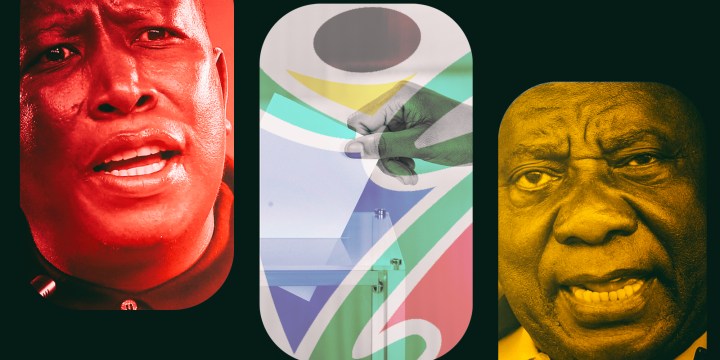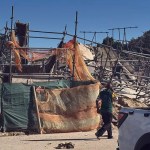ANALYSIS
The ANC/EFF deal in Ekurhuleni may cause more internal ructions in the governing party

This week the ANC and the EFF are expected to try, again, to form what could be their first formal coalition in a Gauteng metro. Last week, they came closer than ever before but, just before a vote was due to be held, they appear to have been unable to agree on who exactly would be the mayor of Ekurhuleni. This important development is hatching just as the ANC councillors are refusing to vote in some other councils nationally even against direct orders.
It is possible that the ANC may find it difficult to implement coalition deals in which the top positions go to other parties. The process of forming coalitions, not unlike in the other parties including the DA, could put huge pressure on internal dynamics within the party, possibly all the way to the point where it may be difficult to enforce discipline.
To examine some of our metros is to see that in places like Joburg and Ekurhuleni (and perhaps soon in some provinces), there will be no sustainable coalition unless two of the three biggest parties work together. In other words, unless the ANC and the EFF, or the DA and the EFF, or the ANC and the DA work together in a coalition, there will be no long-term stability.
On Wednesday afternoon, it appeared the ANC and the EFF had come closer than ever before to reaching a deal. Their councillors were singing together in the council chamber ahead of a vote on the new mayor. It was clear their leaders (including local and provincial leaders) were in talks behind closed doors.
But, before the vote was due to take place, it was announced that it would be postponed (despite a tweet from EFF leader Julius Malema that the city needed to have a mayor that afternoon). The clock is ticking, a council is supposed to have three attempts to elect a mayor and if it fails to do that the province is allowed to intervene. This could mean that Gauteng, in the form of the ANC’s Cogta MEC Lebogang Maile could try to force the council to meet and vote again, or even force it under administration.
While all of this was happening, the leader of the ANC’s Ekurhuleni region, Mzwandile Masina, told TV reporters he was withdrawing his candidacy for the position of mayor. However, just hours later on Thursday morning, he told SAfm he had never been nominated (apart from in the period after last year’s local elections) and thus there was no candidacy to withdraw.
Hours after that, the Ekurhuleni ANC still issued a statement saying he had withdrawn. It went on to say this was because they want to allow a “second layer of leadership to emerge”.
It then confirmed that it will be “putting forth a candidate for the organisation to contest for the mayorship”.
Meanwhile, the EFF had released a statement of its own, saying it disagreed with the delay in the mayoral vote. It also said that “there is no political party or individual who is entitled to any position in Ekurhuleni”.
All of this suggests that while it appears the two parties came close to reaching some agreement, nothing has yet been decided.
It may be important to note at this point that the ANC in that region is led by a person who is perhaps closer to the EFF and Malema than any other party figure. They have publicly indicated that they are friends, and Masina has tweeted his preference for the EFF’s economic policy over that of his own party.
Visit Daily Maverick’s home page for more news, analysis and investigations
This should make it easier for the two parties to work together in this council than anywhere else. And yet, for the moment, it is not yet happening.
There are many issues to examine here.
Currently, the EFF has 13% of the vote in that council, while the ANC has 38%. Under normal circumstances, many would expect the bigger party in a coalition to have more power, or certainly the more powerful positions.
This is what has happened with coalitions led by the DA, where it has appeared to say that, if it is the bigger party, it must have the mayoralty.
Here the EFF appears to believe it should have the mayoralty despite being the (much) smaller party.
Its critics may say that it is supremely arrogant to demand the top position in a coalition with just 13% of the vote. But it is also true that in Joburg the DA currently occupies the position of mayor with just 26% of the vote.
There is also at least one example of a metro being governed in South Africa by a party which had a very small share of the vote.
In Nelson Mandela Bay (NMB), for several years, the UDM’s Mongameli Bobani was mayor, kept in place by the ANC and several other parties.
This led to chaos in that metro, with allegations that the coalition was held together by simple patronage (while Bobani has now passed on, the Hawks had issued an arrest warrant for him in relation to charges of corruption).
It was also the case that in NMB, the UDM and the ANC then did not have the relationship that the EFF and the ANC have now.
Malema has made no secret of his antipathy towards ANC leader, President Cyril Ramaphosa. He has tried to prevent him from speaking in Parliament and appeared to be trying to play a role within the ANC in order to weaken him. Publicly, Malema has often insulted Ramaphosa, while some members of the ANC have hit back (Ronald Lamola once suggested, without evidence, that Malema suffers from megalomania).
The EFF’s Gauteng leader, Nkululeko Dunga (who is also their candidate for Mayor of Ekurhuleni), has repeatedly stated what he believes to be an insult to the ANC, claiming that there is no difference between them and the DA, and that they serve the same master (by which he appears to mean white capital).
Already this may make it difficult for ANC councillors to vote for a party which has insulted them so readily.
But this now appears to tie with another dynamic.
In Lephalale, Limpopo, the DA was able to take control after ANC councillors there refused to vote for their own candidate. This is because they were angry that a former mayor, Alpheus Thulare, had been forced out of office.
This has happened in other places, going all the way back to Tlokwe in 2013, when councillors repeatedly refused to vote for the candidate imposed on them by the ANC, until each councillor was given the benefit of an individual face-to-face meeting with then president Jacob Zuma and then ANC secretary-general Gwede Mantashe.
While this may be a long-running problem in the ANC, it is likely that it is only going to get worse in the near future. It appears that that lack of discipline in the party, and its inability to rein in people who break its rules, is unlikely to change soon.
If the ANC sometimes battles to get its councillors to vote for its own candidates, how difficult could it be to convince them to vote for a candidate from another party?
While some may just refuse to do this out of antipathy towards another party or another candidate, some ANC councillors would stand to lose out simply by voting for another party. They would be voting for patronage to be given to someone else and, perhaps, quite literally, voting for food to be taken from their own mouths.
All of this suggests that making predictions in our politics, and around possibly future coalitions, is going to be nearly impossible. It may be that in Ekurhuleni, the ANC and the EFF are able to form a coalition and agree on a candidate for mayor. But even if they do, that deal may be hard to implement. And it is possible that they are unable to reach a deal.
This means that it is likely that Ekurhuleni actually does not have a mayor for some time. And that it is a harbinger of what is to come in other places. DM



















As long as the ANC plays with itself in public, potholes will get so deep that giraffes will drown. ANC has yet to learn that giraffes matter more than politicians.
Stephen, how can you say that Lamola had no “evidence” of Malema’s megalomania. The media produce evidence virtually every day of his textbook definition of megalomania.